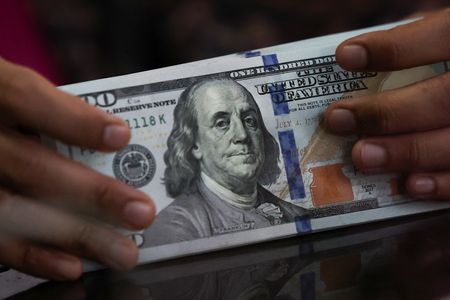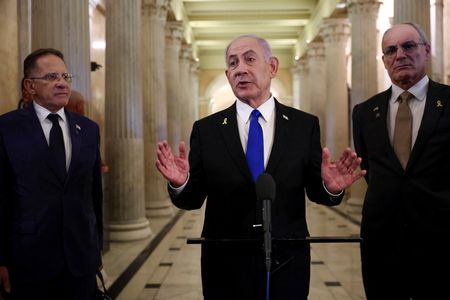By Karin Strohecker and Grant Smith
LONDON (Reuters) -The U.S. dollar’s share of global currency reserves reported to the International Monetary Fund nudged lower to 57.7% in the first quarter of 2025 while the share of euro-denominated reserves gained, International Monetary Fund data showed.
Shares of global currency reserves held in the greenback stood at 57.8% at the end of 2024, while the share of euros gained from 19.8% to 20.1% – their highest since late 2022, according to the IMF’s Currency Composition of Official Foreign Exchange Reserves (COFER) data released on Wednesday.
But it was the Swiss franc which saw the most dramatic increase, quadrupling its share to 0.8% of reserves by end-March – the highest level since at least 1999 when the euro was introduced – while the share of pound sterling also rose.
Foreign currency markets have seen some dramatic swings since the start of the year.
The dollar lost nearly 4% in the first quarter of the year as some big policy swings from the administration under U.S. President Donald Trump, especially on trade, security and the economy, roiled market confidence in the world’s foremost reserve currency.
The decline accelerated dramatically in the second quarter, when the dollar dropped more than 7% in the wake of Trump’s introduction of sweeping tariffs on “Liberation Day” in early April – though some of those measures have been put on hold.
On the flip side, the Swiss franc – widely seen as a safe haven currency – has become one of the best performing currencies this year, strengthening 14% against the dollar.
While currency swings do not equate to reserve managers’ willingness to hold them, the latest events have fuelled a debate on whether the U.S. dollar could be in danger of losing its status as the world’s reserve currency of choice and the center point of the global monetary system. While some point to nascent signs of de-dollarisation, there is broad agreement that any such shift would be very slow.
Looking at levels in claims, U.S. dollar claims did rise 1.4% quarter-on-quarter to $6.72 trillion, though that gain was outpaced by the euro’s 2.6% rise to claims of $2.3 trillion, IMF data showed.
(Reporting by Karin Strohecker in London and Grant Smith in New York, Additional reporting by Alun John, editing by Chizu Nomiyama )








